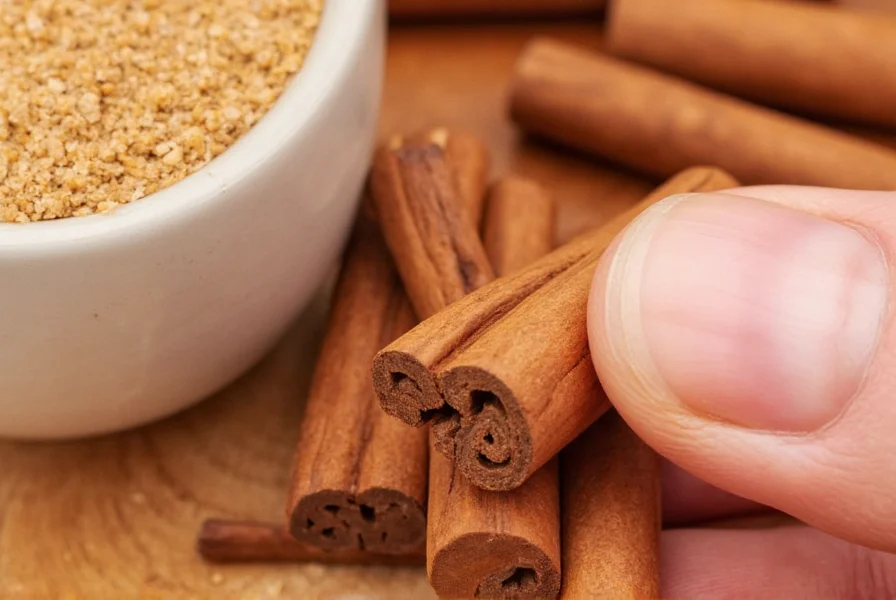Cinnamon isn't just a flavorful spice for your morning coffee or baked goods—it's a powerhouse of health-promoting compounds with centuries of traditional use now validated by modern science. This ancient spice, derived from the inner bark of Cinnamomum trees, contains bioactive components like cinnamaldehyde, cinnamic acid, and cinnamate that interact with your body in multiple beneficial ways.
Science-Backed Health Benefits of Cinnamon
Blood Sugar Regulation and Insulin Sensitivity
One of cinnamon's most well-documented effects is its ability to help manage blood glucose levels. Multiple studies show that cinnamon can reduce fasting blood sugar by 10-29% in people with type 2 diabetes. The spice appears to mimic insulin and enhance glucose uptake by cells, while also slowing carbohydrate digestion in the digestive tract. Research published in the Journal of the Academy of Nutrition and Dietetics found that just 1-6 grams of cinnamon daily (about ½ to 2 teaspoons) significantly improved hemoglobin A1c levels after 90 days.

Powerful Anti-Inflammatory Properties
Chronic inflammation contributes to nearly every modern disease, from heart conditions to neurodegenerative disorders. Cinnamon contains polyphenols that suppress inflammatory pathways in the body. A 2021 review in Nutrients highlighted cinnamon's ability to reduce levels of C-reactive protein (CRP) and interleukin-6 (IL-6), key markers of systemic inflammation. These effects make cinnamon particularly valuable for people with inflammatory conditions like arthritis.
Antioxidant Powerhouse
Cinnamon ranks #1 among 26 common spices for antioxidant activity according to research from Oxidative Medicine and Cellular Longevity. Its high concentration of polyphenols, including flavonoids and phenolic acids, neutralizes free radicals that cause cellular damage. In fact, just one teaspoon of cinnamon provides more antioxidants than a half-cup of blueberries. These compounds help protect against oxidative stress, which accelerates aging and contributes to chronic diseases.
| Benefit | Key Compounds | Effective Daily Dose | Time to Notice Effects |
|---|---|---|---|
| Blood sugar regulation | Cinnamaldehyde, proanthocyanidins | 1-6 grams | 2-4 weeks |
| Anti-inflammatory effects | Eugenol, linalool | 2-4 grams | 3-6 weeks |
| Antioxidant protection | Polyphenols, flavonoids | 1-3 grams | Continuous benefit |
| Heart health support | Cinnamic acid, coumarin (low levels) | 1-4 grams | 8-12 weeks |
Heart Health Support
Regular cinnamon consumption shows promise for cardiovascular health. Clinical trials indicate it can lower total cholesterol, LDL ("bad") cholesterol, and triglycerides while maintaining HDL ("good") cholesterol levels. A meta-analysis in Nutrition Research Reviews found that cinnamon supplementation significantly reduced systolic blood pressure by an average of 5.39 mmHg. These combined effects make cinnamon a valuable dietary addition for those managing cardiovascular risk factors.
Brain Function and Neuroprotection
Emerging research suggests cinnamon may protect against neurodegenerative diseases. Compounds in cinnamon inhibit tau protein aggregation—a hallmark of Alzheimer's disease—and reduce oxidative stress in brain tissue. Animal studies published in the Journal of Alzheimer's Disease showed cinnamon extract improved memory and cognitive function in mice with Alzheimer's-like symptoms. While human studies are still limited, these findings suggest cinnamon could play a role in maintaining brain health as we age.
Ceylon vs. Cassia: Understanding the Difference
Not all cinnamon provides the same health benefits or safety profile. Understanding what cinnamon does for your body requires distinguishing between the two main varieties:
- Ceylon cinnamon (Cinnamomum verum): Known as "true cinnamon," this variety has a delicate flavor and contains significantly lower levels of coumarin (0.004-0.14%). It's safer for regular, long-term consumption.
- Cassia cinnamon (Cinnamomum cassia): The more common and less expensive variety found in most supermarkets. It contains higher coumarin levels (2.15-6.97%), which can cause liver damage with prolonged high-dose consumption.
For regular therapeutic use, health professionals generally recommend Ceylon cinnamon due to its superior safety profile while still providing the same beneficial compounds.

Practical Usage Guidelines
To maximize what cinnamon does for your body while minimizing potential risks:
Recommended Dosage
Research suggests effective daily doses range from 1-6 grams (approximately ½ to 2 teaspoons), though benefits often appear at the lower end of this spectrum. For Cassia cinnamon, limit daily intake to ½ to 1 teaspoon (1-2 grams) to avoid excessive coumarin exposure. Ceylon cinnamon allows for more flexibility, with up to 1-2 teaspoons (3-6 grams) daily considered safe for most adults.
Potential Side Effects and Precautions
While cinnamon is generally safe when consumed in culinary amounts, higher therapeutic doses may cause:
- Oral irritation or mouth sores (especially with direct contact)
- Increased risk of bleeding for those on blood thinners
- Liver toxicity with excessive Cassia cinnamon consumption
- Pregnant women should avoid medicinal doses
Individuals with liver conditions should consult a healthcare provider before using cinnamon therapeutically, particularly Cassia variety.
Best Ways to Incorporate Cinnamon
You don't need supplements to enjoy cinnamon's benefits. Simple ways to add this spice to your diet include:
- Stirring ½ teaspoon into morning coffee or tea
- Sprinkling on oatmeal, yogurt, or fruit
- Adding to smoothies for natural sweetness
- Using in savory dishes like curries and stews
- Creating a cinnamon-honey mixture for natural sore throat relief
Limitations of Current Research
While the evidence for cinnamon's health benefits is promising, it's important to understand the limitations. Most studies have been conducted on animals or in test tubes, with fewer human clinical trials. The effects can vary significantly between individuals based on genetics, overall diet, and health status. Cinnamon should be viewed as a complementary approach rather than a replacement for medical treatment, particularly for conditions like diabetes.
Conclusion: Cinnamon as Part of a Healthy Lifestyle
What cinnamon does for your body is impressive but should be understood within context. This spice offers genuine, science-supported health benefits that make it worthy of regular inclusion in your diet. However, it's not a miracle cure—its effects work best as part of a balanced diet and healthy lifestyle. By choosing Ceylon cinnamon and using it consistently in appropriate amounts, you can harness its blood sugar-regulating, anti-inflammatory, and antioxidant properties to support overall wellness. As with any dietary change, consult your healthcare provider if you have specific health concerns or are taking medications that might interact with cinnamon.
Frequently Asked Questions
How much cinnamon should I take daily for health benefits?
For Ceylon cinnamon, 1-2 teaspoons (3-6 grams) daily provides optimal benefits with minimal risk. If using Cassia cinnamon, limit to ½-1 teaspoon (1-2 grams) daily due to higher coumarin content. Most studies showing blood sugar benefits used 1-3 grams daily.
Can cinnamon lower blood sugar immediately?
Cinnamon doesn't lower blood sugar immediately like medication. Its effects build over time—most studies show significant improvements in blood sugar markers after 4-12 weeks of consistent daily use. It works by improving insulin sensitivity rather than providing an immediate glucose-lowering effect.
Is it safe to take cinnamon every day?
Yes, when consumed in appropriate amounts. Ceylon cinnamon is safe for daily use at culinary doses (up to 2 teaspoons). Cassia cinnamon should be limited to smaller daily amounts (½-1 teaspoon) due to coumarin content. Long-term excessive consumption of Cassia cinnamon may potentially cause liver issues in sensitive individuals.
What's the best time to take cinnamon for maximum benefits?
For blood sugar management, taking cinnamon with carbohydrate-containing meals provides the most benefit, as it helps moderate the post-meal glucose spike. Many people incorporate it into breakfast foods like oatmeal or coffee. Consistent daily use matters more than specific timing for most health benefits.
Can cinnamon help with weight loss?
While cinnamon isn't a weight loss miracle, it may support healthy weight management indirectly. By helping regulate blood sugar and reduce cravings for sweets, it can make it easier to maintain a healthy diet. Some studies suggest it may improve metabolic markers associated with obesity, but it should be combined with proper diet and exercise for weight management.











 浙公网安备
33010002000092号
浙公网安备
33010002000092号 浙B2-20120091-4
浙B2-20120091-4